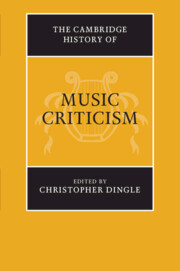Book contents
- The Cambridge History of Music Criticism
- The Cambridge History of Music
- The Cambridge History of Music Criticism
- Copyright page
- Contents
- Music Examples, Figures and Tables
- Notes on Contributors
- Acknowledgements
- Introduction
- Part I The Early History of Music Criticism
- Part II The Rise of the Press
- Part III Critical Influence and Influences
- Part IV Entering the Twentieth Century
- 15 Music Criticism in the United States and Canada up to the Second World War
- 16 Music Criticism in Portugal: Towards an Overview
- 17 Spanish Music Criticism in the Twentieth Century: Writing Music History in Real Time
- 18 Critical Battlegrounds in the French Third Republic
- 19 British Music Criticism, 1890–1945
- 20 Music Criticism in Norway
- 21 Aesthetic Conservatism and Politics in German-Language Music Criticism, 1900–1945
- 22 Music Criticism in Hungary until the Second World War
- 23 The ‘People’ in Czech and Slovak Music Criticism
- Part V New Areas
- Part VI Developments since the Second World War
- Postlude
- Bibliography
- Index
19 - British Music Criticism, 1890–1945
from Part IV - Entering the Twentieth Century
Published online by Cambridge University Press: 21 August 2019
- The Cambridge History of Music Criticism
- The Cambridge History of Music
- The Cambridge History of Music Criticism
- Copyright page
- Contents
- Music Examples, Figures and Tables
- Notes on Contributors
- Acknowledgements
- Introduction
- Part I The Early History of Music Criticism
- Part II The Rise of the Press
- Part III Critical Influence and Influences
- Part IV Entering the Twentieth Century
- 15 Music Criticism in the United States and Canada up to the Second World War
- 16 Music Criticism in Portugal: Towards an Overview
- 17 Spanish Music Criticism in the Twentieth Century: Writing Music History in Real Time
- 18 Critical Battlegrounds in the French Third Republic
- 19 British Music Criticism, 1890–1945
- 20 Music Criticism in Norway
- 21 Aesthetic Conservatism and Politics in German-Language Music Criticism, 1900–1945
- 22 Music Criticism in Hungary until the Second World War
- 23 The ‘People’ in Czech and Slovak Music Criticism
- Part V New Areas
- Part VI Developments since the Second World War
- Postlude
- Bibliography
- Index
Summary
Music criticism in Britain underwent a major transformation in the late nineteenth century, the effects of which were felt far into the twentieth century. The rise of a new school of music criticism facilitated largely by John F. Runciman (1866–1916) helped professionalise the music critic and improve his – and her – literary status. While the reporting of music news and events remained a mainstay of criticism, music critics, through mentoring or self-education, asserted themselves as intellectuals. As a consequence, their writings were no longer simply about music, but often cast in relation to literary, philosophical and historical questions and issues. European, North American and British music criticism had long featured both reporters and intellectuals, but it was in the late nineteenth century that such portfolio careers coalesced and the division that once separated the journalist from the intellectual – or man of letters – was no longer clear-cut.
- Type
- Chapter
- Information
- The Cambridge History of Music Criticism , pp. 371 - 391Publisher: Cambridge University PressPrint publication year: 2019

